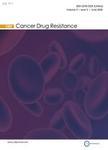Glutaminase inhibition in renal cell carcinoma therapy
作者机构:School of MedicineUniversity of St AndrewsSt Andrews KY169TFUK Biomedical Sciences Research ComplexUniversity of St AndrewsSt AndrewsUK.
出 版 物:《Cancer Drug Resistance》 (癌症耐药(英文))
年 卷 期:2019年第2卷第2期
页 面:356-364页
学科分类:1002[医学-临床医学] 100214[医学-肿瘤学] 10[医学]
基 金:This work was supported by the Melville Trust for Care and Cure of Cancer
主 题:Glutamine addiction renal cell carcinoma combination therapy metabolism
摘 要:Receptor tyrosine kinase inhibitors have been a standard first-line therapy for renal cell carcinoma(RCC)for over a *** they stabilize the disease,they are unable to remove all tumor cells,leading to ***,both intrinsic and acquired resistance to therapy are a significant health *** order to overcome resistance,several combination therapies have been recently approved by the *** approach takes advantage of altered metabolism in tumor cells,which switch to alternative metabolic pathways to sustain their rapid growth and ***-839 is a small molecule inhibitor of kidney type glutaminase(GLS).GLS is often upregulated in glutamine addicted cancers,enhancing glutamine metabolism for the production of energy and the biosynthesis of various cellular building ***-839 is currently in clinical trials for several tumors,including clear cell(cc)RCC,both as monotherapy and in combination with the approved therapeutic agents everolimus,cabozantinib and *** results of Phase 1/2 clinical trials look promising,especially for CB-839 plus cabozantinib,and all combinations seem to be well ***,cancer cells can activate compensatory pathways to overcome glutaminolysis ***,genetic and metabolomic studies are crucial for the successful implementation of CB-839 alone or in combination in subgroups of ccRCC patients.



